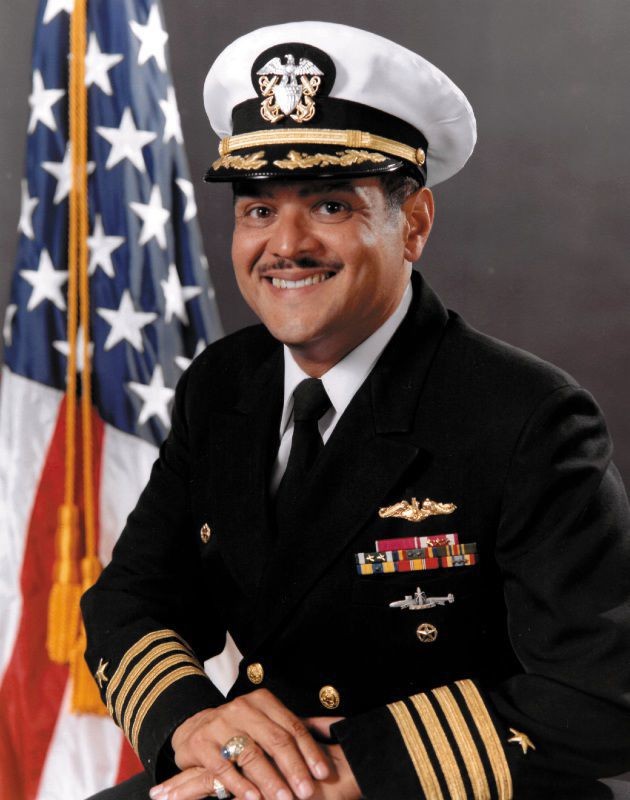Chancellor Alphonso "Pete" Tzomes
30 December 1944−13 June 2019

Captain C.A. "Pete" Tzomes, USN (Ret.)
On 28 May 1983, Pete Tzomes became the first African American to command a nuclear-powered submarine, USS Houston (SSN-713). Six African Americans followed him. The designation "Centennial Seven" — the only African American men to command submarines within the first 100 years of the submarine service — recognizes their accomplishment. Throughout Tzomes’ distinguished career, he demonstrated the importance of having discipline and determination, and not letting others’ perceptions of him define who he was or his potential.
Born Chancellor Alphonso Tzomes on 30 December 1944 in Williamsport, Pennsylvania, he was the eldest of two children to James C. Tzomes and Charlotte E. (Hill) Tzomes. His parents taught him from a young age the principles of hard work and achieving goals. Tzomes planned to become a baseball player until a U.S. Naval Academy midshipman visiting his junior high school showed the film Ring of Valor. When he shared his goal with his counselor, she remarked that it was "unreasonable to expect that a Negro could go to the Academy," but he was not deterred. The Naval Academy did not accept him initially. After additional study at State University of New York, Oneonta, he obtained an appointment to the Naval Academy where he excelled as a math major, in Russian courses, and in athletics. He graduated on 7 June 1967 and received his commission as an ensign. His profile in the 1967 Lucky Bag stated, "Whatever his final decision is, Pete is sure to be a success in any branch of the service." Tzomes hoped to become a Marine Corps pilot but he was too short, so he pursued a career in the submarine force, one of the Navy’s most elite, difficult, and challenging specialties.
His assignments as a submarine officer included:
- Reported to the blue crew on board USS Will Rogers (SSBN-659), February 1969
- Pre-commissioning unit USS Pintado (SSN-672), December 1970
- Engineering officer USS Drum (SSN-672), April 1973
- Executive officer, USS Cavalla (SSN-684), November 1979
- First black commanding officer of a nuclear-powered submarine, USS Houston (SSN-713), May 1983.
His shore tours included:
- Nuclear Propulsion Examining Board on the staff of the Commander, U.S. Pacific Fleet, September 1976 to September 1979
- Director, Equal Opportunity Division, Bureau of Naval Personnel
- Special assistant for equal opportunity to the Deputy CNO for Manpower, Personnel and Training
- Commanding officer, Recruit Training Command, Great Lakes, Illinois, June 1990 to June 1992
- Assistant chief of staff for operations and inspector general at Naval Base, Charleston, South Carolina, where he retired at the rank of captain in 1994.
His awards included:
- Legion of Merit (with 2 gold stars), the Meritorious Service Award (with 3 gold stars), the Navy Commendation Medal (with 2 gold stars), and unit and campaign ribbons, and in 1991 the Black Engineer of the Year Award for his effort to lead the Navy’s equal opportunity programs into the 21st century.
Key quotes by Tzomes include:
- "Once I got through my first couple of submarines, it was like, ‘You know this isn’t bad.’ I liked what submarines did, especially when I started on the fast track, and I liked what they did on what we called, ‘spec ops’ during the Cold War. That was exciting. I said, ‘I want to command one of these.’ If I was going to command one of these, I was going to be the first [African American] and I knew that."
- "The racial thing had nothing to do with motivating me except for the fact that I knew if I got the command that I would be the first. But it wasn’t ‘I want to be the first black commanding officer.’ I want to be a commanding officer. This stuff is fun. I want to be in the change. This is what I want to do, just coincidently I’m black."
- "As a career submarine officer, I thrilled on operating independently from routine guidance and instruction. We were told the objectives of a mission and then were expected to use our professional skills, training and imagination to execute that mission. All citizens of this great democracy should be mindful of exactly what individual contributions are required for maintaining our freedom. I hate to see so many lack appreciation for what our servicemembers and their families sacrifice so the rest of the country can live in freedom and enjoy their freedom of speech."
─Regina T. Akers, Ph.D., Historian,
Histories Branch, Naval History and Heritage Command
Additional Reading:


